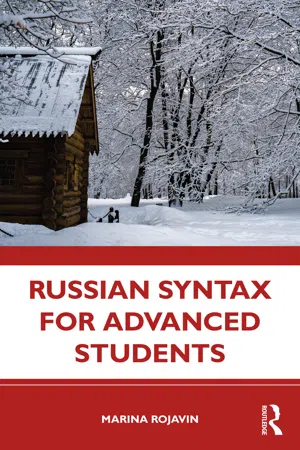
- 240 pages
- English
- ePUB (mobile friendly)
- Available on iOS & Android
Russian Syntax for Advanced Students
About this book
Russian Syntax for Advanced Students is a textbook which illuminates relationships between words, phrases, clauses, and sentences.
Using this book, students will acquire conscious knowledge of how words function in various syntactical constructions as applied to discourse, such as specific verbal situations, based not only on the underlying linguistic phenomena, but also on the content of sociolinguistic situations. The book helps develop communicative skills for advanced mastery and constantly emphasizes the importance of accuracy in the use of syntactic structures.
Russian Syntax is designed primarily as a textbook for classroom use for intermediate-high and advanced-level students. The text is also suitable for independent study by graduate students in linguistics or pedagogy, as well as being a valuable reference for instructors.
Tools to learn more effectively

Saving Books

Keyword Search

Annotating Text

Listen to it instead
Information
PART I
The simple sentence
1SIMPLE SENTENCES
Main topics
- Declarative sentences
- Imperative sentences
- – Perfective and imperfective imperative verbs
- – The particles давáй(те); пусть‚ пускáй; бы with conditional mood; да; infinitives; verbs in the second person; in the past tense
- Interrogative sentences
- – With and without question words
- – With the particles неужéли, рáзве, ли
- Exclamatory sentences
- Negative sentences
Declarative sentences
| В прόшлом годý лéто бьɪ́ло дождли́вое. | Last year, the summer was rainy. |
| В воскресéнье у нас бýдет вечери́нка. | On Sunday, there’ll be a party at our place. |
| Мáша болéет ужé вторýю недéлю. | This is Masha’s second week being sick. |
Imperative sentences
| Ка́тя‚ возьми́ в холоди́льнике во́ду‚ нале́й в стака́н и принеси́ ба́бушке. | Katia, get some water from the fridge, pour a glass, and bring it to Grandma. |
| Предъяви́те вáши билéты! | Show your tickets! |
| Сходи́те на вьɪ́ставку цветόв! | Go to the flower show! |
| ПокажИ́те домáшние задáния. | Show your homework. |
| Пиши́ кáждую недéлю. | Write every week. |
| Звони́те чáще. | Call us more often. |
| Пόмните‚ что у нас билéты на восьмόе. | Remember that we have tickets for the 8th. |
| Сади́тесь, пожáлуйста. | Please take a seat. |
Sayings
| Век живи́ – век учи́сь. | Live and learn (Lit.: Live for a century—learn for a century). |
| Ищи́ вéтра в пόле. | Go on a wild goose chase (Lit.: Search for the wind in a field). |
Mini-dialogue

| Отéц протянýл сьɪ́ну газéту: «Прочитáй‚ что там напи́сано, – мáльчик нáчал читáть‚ но вдруг останови́лся. – Ну‚ читáй же‚ читáй». | The father held out a newspaper to his son. “Read what it says there.” The boy started reading, but suddenly stopped. “Come on, read, then, read!” |
Say it and write it correctly
| Не ешь‚ éсли не хόчешь. | Don’t eat if you don’t... |
Table of contents
- Cover
- Half Title
- Title
- Copyright
- Contents
- About the book and acknowledgements
- Introduction
- Abbreviations
- Syntax defined
- Part I The simple sentence
- Part II Compound sentences
- Part III Complex sentences
- Part IV Direct and indirect speech
- Part V Punctuation marks
- Full and short names
- Sources
- Bibliography
- Index
Frequently asked questions
- Essential is ideal for learners and professionals who enjoy exploring a wide range of subjects. Access the Essential Library with 800,000+ trusted titles and best-sellers across business, personal growth, and the humanities. Includes unlimited reading time and Standard Read Aloud voice.
- Complete: Perfect for advanced learners and researchers needing full, unrestricted access. Unlock 1.4M+ books across hundreds of subjects, including academic and specialized titles. The Complete Plan also includes advanced features like Premium Read Aloud and Research Assistant.
Please note we cannot support devices running on iOS 13 and Android 7 or earlier. Learn more about using the app